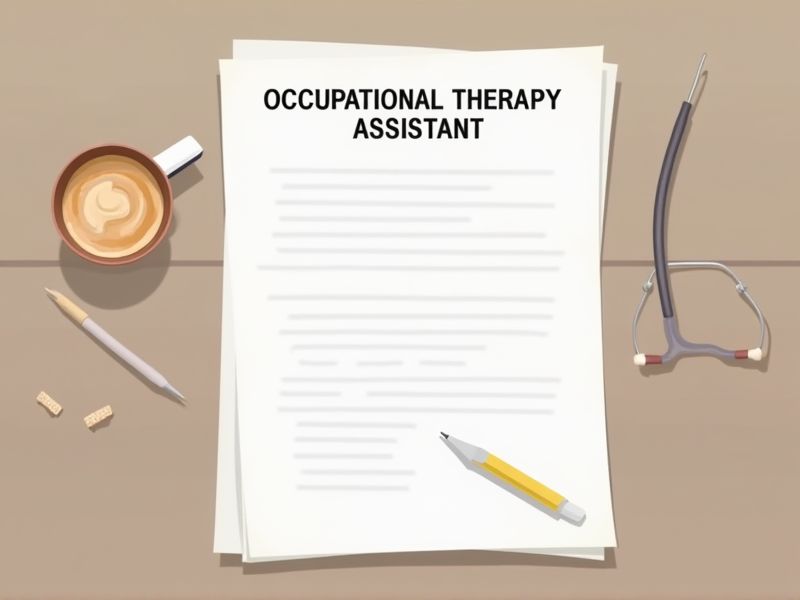
Occupational Therapy Assistants must obtain specific certifications to ensure they can effectively support licensed occupational therapists and provide quality care to patients. These certifications verify the assistant's proficiency in therapeutic techniques and patient interaction, which is crucial for patient safety and rehabilitation outcomes. Regulatory bodies require these certifications to maintain industry standards and adhere to legal requirements. Consider these important certifications you may need as an Occupational Therapy Assistant.
National Board Certification in Occupational Therapy Assistant (NBCOTA)
National Board Certification for Occupational Therapy Assistants ensures that individuals meet standardized professional knowledge and skills crucial for effective patient care. Holding this certification often enhances employment opportunities as it demonstrates a validated commitment to maintaining high professional standards. Certified assistants tend to be more trusted by employers and patients, influencing the quality and reliability of care provided. This certification might also be a requirement for licensure in some states, directly affecting the ability to practice legally.
State Occupational Therapy Assistant License
The State Occupational Therapy Assistant License ensures that occupational therapy assistants meet standardized educational and professional criteria, safeguarding public safety and trust. Licensing validates the qualifications and competency of assistants, enabling them to provide effective therapy services under supervision. It also facilitates accountability, allowing regulatory bodies to monitor and address any breaches of professional conduct. Without the license, practice would be illegal, thereby impacting career opportunities and employment options.
Basic Life Support (BLS) Certification
Basic Life Support (BLS) certification equips occupational therapy assistants with essential skills to handle cardiac and breathing emergencies, ensuring patient safety. BLS training enhances confidence in responding effectively to life-threatening situations, which is critical in clinical settings. Employers often require BLS certification to meet healthcare standards and regulations. Certified staff contribute to a safer therapeutic environment, improving patient outcomes and trust.
Cardiopulmonary Resuscitation (CPR) Certification
Occupational Therapy Assistants (OTAs) often work with patients at risk of health emergencies, necessitating CPR certification to respond effectively during cardiovascular crises. The certification enables OTAs to handle sudden cardiac arrests in a variety of healthcare settings, enhancing patient safety. CPR training ensures OTAs can contribute to a coordinated emergency response, potentially saving lives during critical incidents. Certification aligns with healthcare standards, underscoring the OTA's role in comprehensive patient care.
First Aid Certification
First aid certification equips occupational therapy assistants with necessary skills to manage emergencies and reduce risks in therapeutic environments. The training fosters confidence and competency in handling patient crises, directly impacting patient safety and care quality. Employers often require certification to ensure that all team members are prepared for unexpected situations, aligning with regulatory and safety standards. Possessing first aid certification enhances the assistant's professional profile, making them more versatile and valuable in clinical settings.
HIPAA Compliance Certification
Ensuring HIPAA compliance for an Occupational Therapy Assistant helps protect patient privacy by preventing unauthorized access to sensitive health information. Adhering to these standards reduces the risk of data breaches, which can lead to legal repercussions and significantly harm a healthcare organization's reputation. Compliance certification demonstrates the assistant's commitment to maintaining security protocols, fostering trust between the therapist, patients, and larger healthcare team. Without compliance, there could be financial penalties and potential loss of employment for the assistant.
OSHA Safety Certification
OSHA Safety Certification is needed for occupational therapy assistants to ensure a comprehensive understanding of workplace safety hazards and protocols, which directly minimizes the risk of injuries during patient handling. By being OSHA certified, assistants can effectively contribute to a safer therapeutic environment, enhancing patient and coworker protection. This certification equips them with up-to-date safety standards and regulatory compliance, reducing liability for both themselves and their employers. The training increases an assistant's confidence and competency in emergency situations, ultimately supporting overall patient care quality.
Medical Terminology Certification
Obtaining a Medical Terminology Certification enhances an Occupational Therapy Assistant's ability to accurately understand and communicate complex medical information. This certification leads to improved patient care due to precise interpretation of physician instructions and medical records. Understanding medical terminology decreases the likelihood of errors in documentation and treatment plans. As a result, certified assistants often experience better professional credibility and job prospects within healthcare settings.
Manual Handling Certification
Manual handling certification ensures Occupational Therapy Assistants understand proper techniques to reduce injury risks. Without this training, improper lifting can lead to musculoskeletal injuries, affecting both staff and patient safety. Certification provides standardized guidelines that align with health regulations, ensuring compliance and reducing liability. Knowledge from the certification helps in creating a safer work environment, promoting patient and staff well-being.
Geriatric Care Certification
The rise in the aging population increases the demand for specialized geriatric care, making certification crucial for Occupational Therapy Assistants to effectively address their unique health challenges. Understanding the complexities of age-related conditions ensures better patient outcomes and enhances the quality of care. Certification broadens employment opportunities and keeps professionals competitive in a field prioritizing specialists. Healthcare regulations and standards continually evolve, necessitating updated expertise through structured certification.
Summary
When you obtain certifications as an Occupational Therapy Assistant, your professional skill set broadens, increasing your competence in specialized areas. This enhanced expertise often leads to expanded job opportunities and, potentially, higher earnings. Your ability to provide targeted care improves, which can result in better patient outcomes and satisfaction. Employers may also view you as a more valuable asset to their team, enhancing your job security and career growth.
